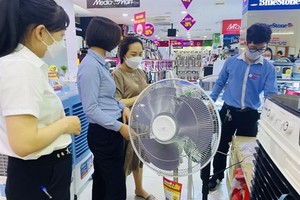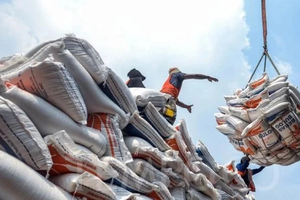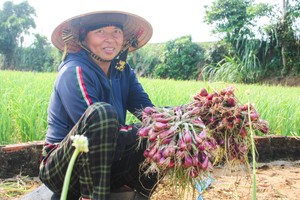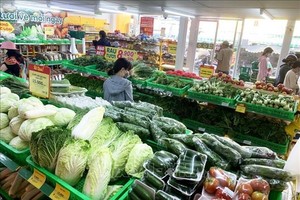 Production at PALTAL Fashion Company in District 12 in Ho Chi Minh City. (Photo: SGGP)
Production at PALTAL Fashion Company in District 12 in Ho Chi Minh City. (Photo: SGGP)
Orders still come regularly
According to the Ministry of Industry and Trade, the most recent statistics show that from the beginning of the year to now, textile and garment export turnover has reached US$12.2 billion, up 15% compared to the same period last year. Currently, the US continues to be the largest textile and garment importer of Vietnam, accounting for nearly 50% of the country's total textile and garment export value, followed by the Japanese, European, Eurasian, and Chinese markets.
Mr. Pham Van Viet, CEO of Viet Thang Jeans Limited Company, confirmed that the company's orders are now enough for production until the end of the third quarter of this year. Orders are still being placed by its partners, but the company is still cautious when receiving them. Sharing that joy, Mr. Pham Xuan Hong, Chairman of the Ho Chi Minh City Textile and Garment Embroidery Association, added that with the number of signed orders, until the end of the year, enterprises will no longer have to worry.
Similarly, Mr. Nguyen Duc Thuan, Chairman of the Vietnam Leather, Footwear, and Handbag Association, said that the orders of footwear enterprises are also relatively plentiful, especially in the European market. After the EU-Vietnam Free Trade Agreement (EVFTA) became effective in August last year, the industry's export orders have increased sharply. Statistics by the General Department of Vietnam Customs show that by May this year, Vietnam's footwear export turnover hit US$8.5 billion, an increase of 26.4%, especially in the European market, the increase exceeded 20%.
However, the complicated situation of the pandemic has been causing many enterprises to worry. Mr. Pham Xuan Hong said that, on average, garment and textile enterprises have about 1,000 workers. Large enterprises can have up to 10,000 workers. Therefore, the risk of enterprises facing "sudden death" for a certain period because their workers are infected with Covid-19 is extremely high. Meanwhile, if the delivery time is delayed, the enterprise might lose both the shipping costs and compensation for the contract.
Moreover, according to analysts, the placing of orders for textile, garment, and footwear products from countries around the world has changed a lot compared to before. To minimize risks, partners importing textiles and garments in export markets often place large orders with short delivery times. Mr. Vu Duc Giang, Chairman of the Vietnam Textile and Apparel Association, said that only large enterprises could meet this trend. It explains why large textile and garment enterprises have many orders, while enterprises with small and medium-sized manufacturing scales face a scarcity of orders.
Mr. Pham Van Viet said that although Covid-19 vaccination for workers has been implementing in many industrial parks, many enterprises have not had the opportunity to vaccinate their workers. Therefore, he suggested that the Ministry of Health should support the vaccination for workers or create conditions for enterprises to buy vaccines and vaccinate their workers soon. The Ministry of Health and the Department of Health of Ho Chi Minh City should provide Covid-19 rapid test kits to prevent the risk of disease spreading in enterprises.
Proactively respond to trade remedies
According to analysts, the textile, garment, and footwear manufacturing industries have had a rapid recovery after the global consumption market was interrupted last year. It has opened up many development opportunities for domestic enterprises.
However, along with the above opportunities, enterprises are still concerned about trade remedy measures that many markets in the world are and will apply to Vietnamese textile, garment, and footwear products. According to the Vietnam Textile and Apparel Association, most recently, at the beginning of June this year, the US Government imposed trade remedy taxes on polyester-drawn textured yarn originating from Vietnam. In this case, Vietnamese enterprises were determined to have a dumping margin from 2.67% to 22.82%.
As for the footwear industry, although it has not faced trade remedy investigations yet, many enterprises are worried when the source of domestic raw materials is depleting. According to Mr. Nguyen Duc Thuan, to be able to take advantage of the tariff incentives from the free trade agreement, the rules of origin of goods must be met. With the supply of raw materials not proportional to the quantity of exported goods, enterprises are forced to find raw material sources from many other markets, negatively affecting the competitive advantage of Vietnamese goods in export markets.
And yet, from October this year, the Eurasian market will officially take Vietnam out of the list of countries in the Generalized System of Preferences. This also means that Vietnamese textiles, garments, and footwear products, when exporting to this market, will be imposed a normal tax rate instead of the previous zero percent tax rate. Besides, many other textile and garment products have been applied to trade remedies by Turkey and Europe.
According to the Ministry of Industry and Trade, the most recent statistics show that from the beginning of the year to now, textile and garment export turnover has reached US$12.2 billion, up 15% compared to the same period last year. Currently, the US continues to be the largest textile and garment importer of Vietnam, accounting for nearly 50% of the country's total textile and garment export value, followed by the Japanese, European, Eurasian, and Chinese markets.
Mr. Pham Van Viet, CEO of Viet Thang Jeans Limited Company, confirmed that the company's orders are now enough for production until the end of the third quarter of this year. Orders are still being placed by its partners, but the company is still cautious when receiving them. Sharing that joy, Mr. Pham Xuan Hong, Chairman of the Ho Chi Minh City Textile and Garment Embroidery Association, added that with the number of signed orders, until the end of the year, enterprises will no longer have to worry.
Similarly, Mr. Nguyen Duc Thuan, Chairman of the Vietnam Leather, Footwear, and Handbag Association, said that the orders of footwear enterprises are also relatively plentiful, especially in the European market. After the EU-Vietnam Free Trade Agreement (EVFTA) became effective in August last year, the industry's export orders have increased sharply. Statistics by the General Department of Vietnam Customs show that by May this year, Vietnam's footwear export turnover hit US$8.5 billion, an increase of 26.4%, especially in the European market, the increase exceeded 20%.
However, the complicated situation of the pandemic has been causing many enterprises to worry. Mr. Pham Xuan Hong said that, on average, garment and textile enterprises have about 1,000 workers. Large enterprises can have up to 10,000 workers. Therefore, the risk of enterprises facing "sudden death" for a certain period because their workers are infected with Covid-19 is extremely high. Meanwhile, if the delivery time is delayed, the enterprise might lose both the shipping costs and compensation for the contract.
Moreover, according to analysts, the placing of orders for textile, garment, and footwear products from countries around the world has changed a lot compared to before. To minimize risks, partners importing textiles and garments in export markets often place large orders with short delivery times. Mr. Vu Duc Giang, Chairman of the Vietnam Textile and Apparel Association, said that only large enterprises could meet this trend. It explains why large textile and garment enterprises have many orders, while enterprises with small and medium-sized manufacturing scales face a scarcity of orders.
Mr. Pham Van Viet said that although Covid-19 vaccination for workers has been implementing in many industrial parks, many enterprises have not had the opportunity to vaccinate their workers. Therefore, he suggested that the Ministry of Health should support the vaccination for workers or create conditions for enterprises to buy vaccines and vaccinate their workers soon. The Ministry of Health and the Department of Health of Ho Chi Minh City should provide Covid-19 rapid test kits to prevent the risk of disease spreading in enterprises.
Proactively respond to trade remedies
According to analysts, the textile, garment, and footwear manufacturing industries have had a rapid recovery after the global consumption market was interrupted last year. It has opened up many development opportunities for domestic enterprises.
However, along with the above opportunities, enterprises are still concerned about trade remedy measures that many markets in the world are and will apply to Vietnamese textile, garment, and footwear products. According to the Vietnam Textile and Apparel Association, most recently, at the beginning of June this year, the US Government imposed trade remedy taxes on polyester-drawn textured yarn originating from Vietnam. In this case, Vietnamese enterprises were determined to have a dumping margin from 2.67% to 22.82%.
As for the footwear industry, although it has not faced trade remedy investigations yet, many enterprises are worried when the source of domestic raw materials is depleting. According to Mr. Nguyen Duc Thuan, to be able to take advantage of the tariff incentives from the free trade agreement, the rules of origin of goods must be met. With the supply of raw materials not proportional to the quantity of exported goods, enterprises are forced to find raw material sources from many other markets, negatively affecting the competitive advantage of Vietnamese goods in export markets.
And yet, from October this year, the Eurasian market will officially take Vietnam out of the list of countries in the Generalized System of Preferences. This also means that Vietnamese textiles, garments, and footwear products, when exporting to this market, will be imposed a normal tax rate instead of the previous zero percent tax rate. Besides, many other textile and garment products have been applied to trade remedies by Turkey and Europe.
Currently, the Ministry of Industry and Trade and domestic enterprises have quickly reacted when there are trade remedy lawsuits. Enterprises have actively improved the capacity of the legal departments to respond immediately upon request. In the context of the complicated developments of the Covid-19 pandemic, many enterprises have proposed that the Government should not adjust the regional minimum wage increase, which is expected to start from July 1, 2021, to create conditions to support and energize enterprises to maintain stable production and overcome the current difficult situation.
























